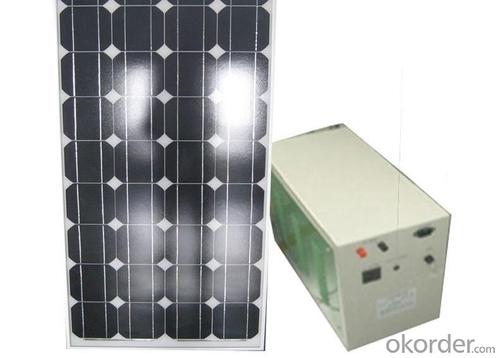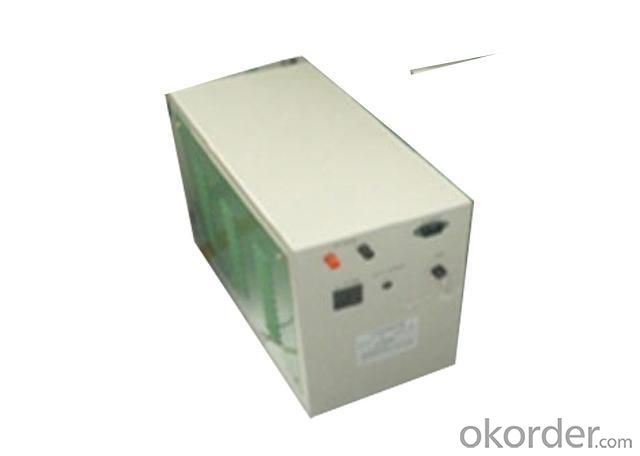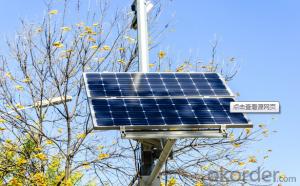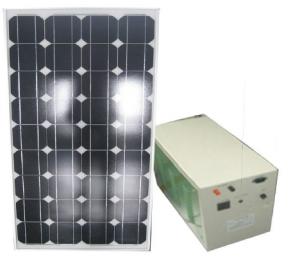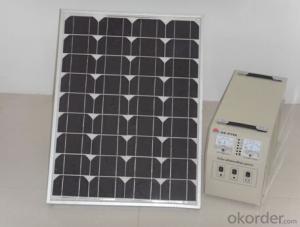Solar Energy Systems Perth WA CNBM-K2 (80W) Solar Home System
- Loading Port:
- China Main Port
- Payment Terms:
- TT
- Min Order Qty:
- 1 set set
- Supply Capability:
- 1000 sets per month set/month
OKorder Service Pledge
OKorder Financial Service
You Might Also Like
Brief Introduction of Solar Home System CNBM-K2 (80W)
CNBM Home System-K2 (80W) has a wonderful capacity.It can be used in factory,home,school and other CNBM Home System-K2 (80W) consist of the solar modules,charge controller,inverter and battery banks.
CNBM International is highly recognized by its business partners and clients all over the world and has obtained rapid development under the spirit of win-win .
With CNBM Home SystemK2 (80W),We will carry on the mutual beneficial,innovative and revolutionary trading structure as we did before,create value for our employees,share holders and clients and benefit the whole society in our future development.Please contact us ,if you have interest in CNBM Home System-K2 (80W),don’t hesitate!
The Sketching of Solar Home System CNBM-K2 (80W)
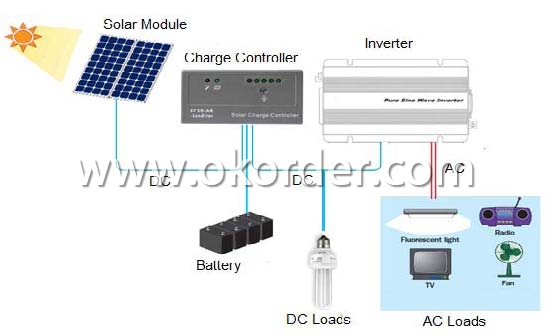
Components of Solar Home System CNBM-K2 (80W)
PV Array:
Convert sunlight instantly into DC electric power. Formed by the solar modules (also called photovoltaic modules) in accordance with the system requirements for series and parallel.
Solar Charge Controller:
A charge controller may be used to power DC equipment with solar panels. The charge controller provides a regulated DC output and stores excess energy in a battery as well as monitoring the battery voltage to prevent over charge or over discharge. An inverter can be connected to the output of a charge controller to drive AC loads.
Inverter:
Converts DC output power of photovaltaic soalr panels into standard AC power for use in the local off-grid electrical network. It is a critical component in a photovoltaic system, allowing the use of ordinary commercial appliances.
Battery banks:
Stores energy when there is an excess coming in and distribute it back out when there is a demand. Solar PV panels continue to re-charge batteries each day to maintain battery charge.
Technical data of Solar Home System CNBM-K2 (500W) | ||
Inverter | Rated load power | 500W |
Output wave | Modify sine wave | |
Output voltage | DC 12V | |
Output frequency | DC:12V AC:220V | |
Precision of output | 50HZ/60HZ | |
Precision of output frequency | ±6% | |
Solar panel | Pmax | 80W |
Vmp | 17.8V | |
Imp | 4.49A | |
Charger | Charger voltage & current | 12V 10A |
Battery | Capacity | 12V 40AH |
Power box | Spray paint iron box,with input,output,ammeter,voltmeter,master swith and so on. | |
Package of Solar Home System CNBM-K1 (60W) | ||||
Part | Size(L*W*H mm) | Weight(kg) | 20’(pcs) | 40’(pcs) |
Power box | 580*280*540 | 50 | 120 Sets | 280 Sets |
Solar panel | 890*670*30 | 8 | ||
Battery | 200*180*170 | 15 | ||
Factory Picture of Solar Home System CNBM-K2 (80W)
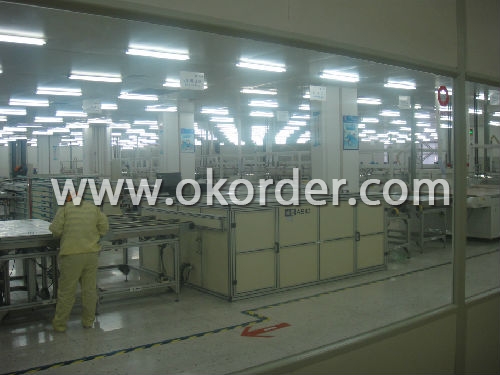
Package Picture of Solar Energy System CNBM-K2 (80W)
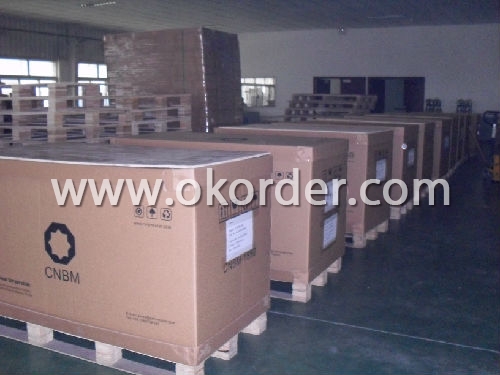
- Q: Can solar energy systems be used in areas with limited access to solar fuses and breakers?
- Yes, solar energy systems can still be used in areas with limited access to solar fuses and breakers. While fuses and breakers are important components for safety and protection in a solar energy system, there are alternative methods available to ensure the system operates safely. These can include using surge protectors, isolators, and other protective devices to prevent overloads and short circuits. Additionally, proper installation, regular maintenance, and adherence to safety guidelines can help mitigate risks even in areas with limited access to solar fuses and breakers.
- Q: What is the role of solar trackers in solar energy systems?
- The role of solar trackers in solar energy systems is to optimize the efficiency and output of solar panels by tracking the movement of the sun throughout the day. Solar trackers automatically adjust the position of the panels to ensure that they are always facing the sun at the optimal angle, maximizing the absorption of sunlight and increasing the overall energy generation of the system.
- Q: Can solar energy systems be used in powering warehouses or distribution centers?
- Yes, solar energy systems can be used to power warehouses or distribution centers. Solar panels can be installed on the roofs of these buildings to convert sunlight into electricity, which can then be used to meet their energy needs. This can help reduce reliance on traditional energy sources and lower operating costs while also promoting sustainability.
- Q: Can solar energy systems be used in powering telecommunications towers?
- Yes, solar energy systems can be used to power telecommunications towers. Solar energy is a renewable source of power that harnesses the sun's energy to generate electricity. Telecommunications towers require a constant and reliable source of electricity to operate their equipment, and solar energy can provide a sustainable solution for this need. Solar panels can be installed on the tower or in the vicinity to capture sunlight and convert it into electricity. This energy can then be stored in batteries for use during periods of low sunlight or at night. In remote or off-grid locations where access to the electrical grid is difficult or expensive, solar energy systems can be particularly beneficial for powering telecommunications towers. Additionally, solar power reduces dependence on fossil fuels, decreases carbon emissions, and lowers operating costs in the long run. Overall, solar energy systems offer a viable and eco-friendly option for powering telecommunications towers.
- Q: Can a solar energy system be used in cold climates?
- Yes, a solar energy system can be used in cold climates. While solar panels may be less efficient in extreme cold temperatures, they can still generate electricity as long as sunlight is available. Additionally, certain solar technologies, such as solar thermal systems, can even be more effective in cold climates as they can provide heat for space heating or hot water in winter.
- Q: What permits or approvals are required for installing a solar energy system?
- The permits and approvals required for installing a solar energy system may vary depending on the location and regulations of the specific jurisdiction. Generally, some common permits and approvals that might be required include building permits, electrical permits, zoning permits, and interconnection agreements with the local utility company. It is recommended to consult with local authorities or hire a professional installer who can guide you through the specific requirements in your area.
- Q: Can solar panels be installed on agricultural land without affecting crop production?
- Yes, solar panels can be installed on agricultural land without significantly affecting crop production. By utilizing techniques such as elevated panel mounting, rotational grazing, and optimizing panel spacing, farmers can ensure that solar panels are installed in a way that minimizes shading and allows crops to receive adequate sunlight. Additionally, solar panels can provide dual-use benefits by creating shaded environments that can benefit certain crops, reducing water evaporation and weed growth. Proper planning and design, along with open communication between solar developers and farmers, can help ensure that solar installations and agricultural activities can coexist harmoniously.
- Q: How much energy can a solar energy system generate?
- The amount of energy a solar energy system can generate depends on various factors such as the size and efficiency of the system, the amount of sunlight available, and the location of the system. On average, a well-designed solar energy system can generate enough electricity to power a significant portion of a household's energy needs. However, larger systems or those installed in areas with abundant sunlight can generate even more energy, potentially allowing for surplus energy to be fed back into the grid.
- Q: How much space is required for a solar energy system?
- The amount of space required for a solar energy system depends on various factors, such as the system's capacity, the type of technology used, and the available sunlight. Generally, for residential applications, a rooftop solar system typically requires around 100-400 square feet of space per kilowatt of capacity. On the other hand, larger utility-scale solar installations might need several acres of land to accommodate the solar panels.
- Q: Can solar energy systems be used for powering hospitals?
- Yes, solar energy systems can be used for powering hospitals. Solar power can provide a reliable and sustainable energy source for hospitals, helping to reduce their dependence on the grid and lower their energy costs. Solar panels can be installed on hospital rooftops or in nearby areas to generate electricity that can be used to power various hospital operations and equipment. Additionally, solar energy systems can provide backup power during emergencies or grid failures, ensuring continuous operation of critical medical equipment.
Send your message to us
Solar Energy Systems Perth WA CNBM-K2 (80W) Solar Home System
- Loading Port:
- China Main Port
- Payment Terms:
- TT
- Min Order Qty:
- 1 set set
- Supply Capability:
- 1000 sets per month set/month
OKorder Service Pledge
OKorder Financial Service
Similar products
Hot products
Hot Searches
Related keywords



